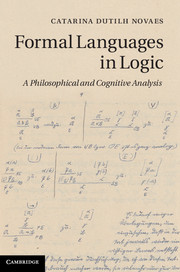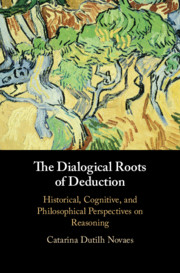Formal Languages in Logic
A Philosophical and Cognitive Analysis
- Author: Catarina Dutilh Novaes, University of Groningen
- Date Published: November 2012
- availability: Temporarily unavailable - available from TBC
- format: Hardback
- isbn: 9781107020917
Hardback
Other available formats:
Paperback, eBook
Looking for an inspection copy?
This title is not currently available for inspection. However, if you are interested in the title for your course we can consider offering an inspection copy. To register your interest please contact [email protected] providing details of the course you are teaching.
-
Formal languages are widely regarded as being above all mathematical objects and as producing a greater level of precision and technical complexity in logical investigations because of this. Yet defining formal languages exclusively in this way offers only a partial and limited explanation of the impact which their use (and the uses of formalisms more generally elsewhere) actually has. In this book, Catarina Dutilh Novaes adopts a much wider conception of formal languages so as to investigate more broadly what exactly is going on when theorists put these tools to use. She looks at the history and philosophy of formal languages and focuses on the cognitive impact of formal languages on human reasoning, drawing on their historical development, psychology, cognitive science and philosophy. Her wide-ranging study will be valuable for both students and researchers in philosophy, logic, psychology and cognitive and computer science.
Read more- Draws on history, philosophy, logic and empirical sciences to discuss the concept of formal languages
- Does not presuppose extensive previous knowledge; the volume is essentially self-contained and self-explanatory
- The arguments presented here also apply to uses of formalisms in other disciplines, including the empirical and social sciences
Reviews & endorsements
'Since the rise of logical empiricism, formal languages have become essential tools of doing philosophy. But why does formalization work? And what are its limitations? This book fills a crucial gap in the literature by addressing these questions from a cognitive, historical, and logical point of view. I recommend it to formal philosophers, critics of formal philosophy, and everyone with an interest in the techniques of conceptual engineering per se.' Hannes Leitgeb, Ludwig Maximilians Universität Munich
Customer reviews
Not yet reviewed
Be the first to review
Review was not posted due to profanity
×Product details
- Date Published: November 2012
- format: Hardback
- isbn: 9781107020917
- length: 282 pages
- dimensions: 236 x 158 x 20 mm
- weight: 0.56kg
- contains: 4 b/w illus. 4 tables
- availability: Temporarily unavailable - available from TBC
Table of Contents
Introduction
1. Two notions of formality
2. On the very notion of a formal language
3. The history, purposes and limitations of formal languages
4. How we do reason, and the need for counterbalance in science
5. Formal languages and extended cognition
6. De-semantification
7. The debiasing effect of formalization
Conclusion.
Sorry, this resource is locked
Please register or sign in to request access. If you are having problems accessing these resources please email [email protected]
Register Sign in» Proceed
You are now leaving the Cambridge University Press website. Your eBook purchase and download will be completed by our partner www.ebooks.com. Please see the permission section of the www.ebooks.com catalogue page for details of the print & copy limits on our eBooks.
Continue ×Are you sure you want to delete your account?
This cannot be undone.
Thank you for your feedback which will help us improve our service.
If you requested a response, we will make sure to get back to you shortly.
×


